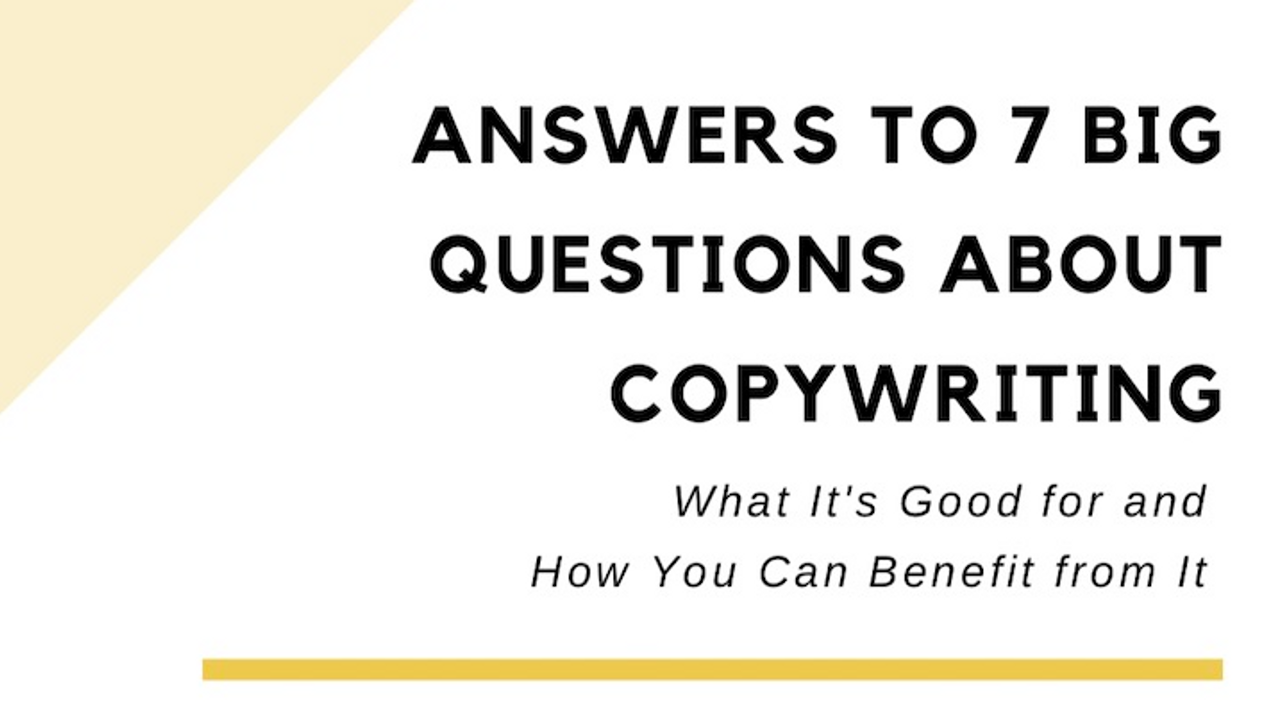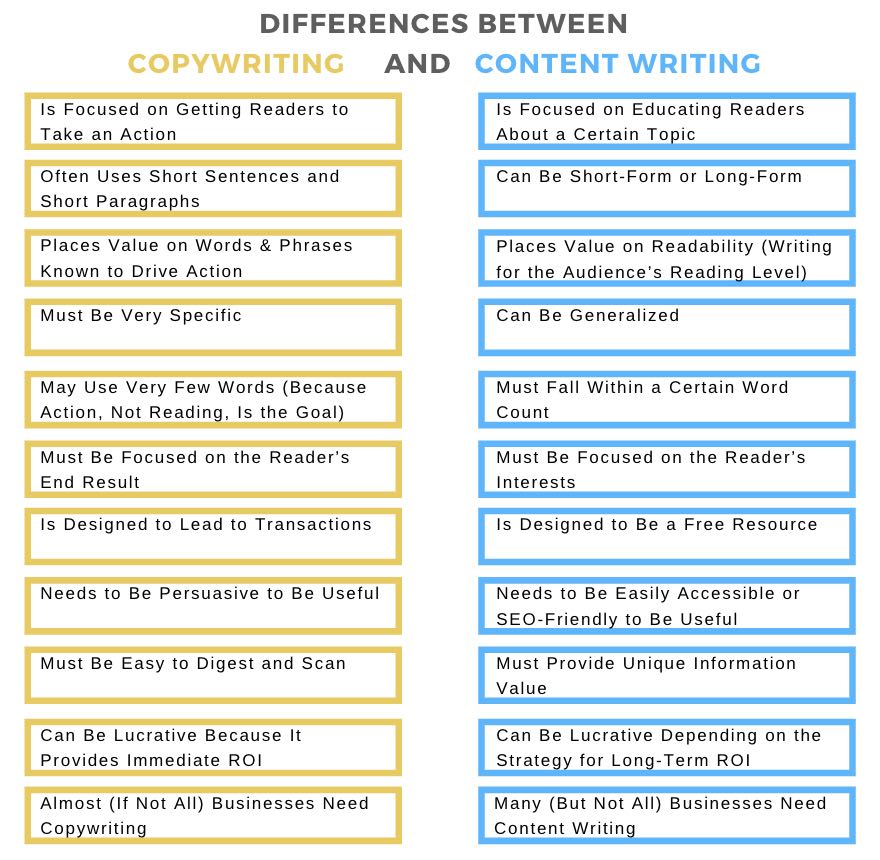Answers to 7 Big Questions About Copywriting

Want to know more about copywriting?
You may have some questions — I certainly did when I first started. I spent six years as an editor in content marketing before discovering this specialty.
I realized that I liked writing ads, and upon further investigation, found that this form of writing I enjoyed was called “copywriting.”
I enrolled in an online copywriting course for about $1500. I studied the materials intently, highlighting the transcripts of the videos, writing notes, and imitating the writing examples. When the company I was working for was bought by another company, I decided to see if I could get a copywriting position — despite having no vocational experience in the field.
I applied for a position and worked very hard to demonstrate through sample projects that I was a proficient copywriter. They hired me without experience — and for $20,000 more than I had been making at my previous job.
If someone could have told me that spending $1500 would result in $20,000 more per year — and a slew of job opportunities, connections, and the ability to eventually run my own business — I’m not sure I would have believed it. Needless to say, I’m grateful to have made the investment.
Today, with a much greater range of experience, I’ve created my own copywriting course for those who are ready to tap into the potential of this skill set. It’s called Transformation Copywriting™, and it’s packed with the insights, techniques, and principles I’ve learned from writing sales copy for New York Times and Wall Street Journal bestselling authors, working with national and global brands, and helping business owners sell millions of dollars worth of products online.
If you really want to learn copywriting, I encourage you to check it out. For now, I hope this guide will help you discover more about how valuable copywriting can be — and whether learning this skill set is right for you!
Happy learning,
Anna @ CreativeDemand
#1 - What Is Copywriting?
Copywriting is a valuable form of sales writing that focuses on getting readers to take a particular action. The word “copy” comes from a Latin word that means “to transcribe.” Historically, it has been used to refer to copied text.
However, in the modern context of digital marketing, copy is referred to as the text for websites, landing pages, ads, marketing collateral, and sales emails that are promoting brands and products. Content writing, on the other hand, is text written to educate readers, not necessarily to get them to take a particular action. Blog posts, research articles, and training materials are content pieces, not pieces of copywriting.

#2 - How Is Copywriting Useful to Businesses Today?
With so much business being done online, every business needs a website that has compelling, relevant copy that drives action. The ability to advertise widely online and to create sales funnels also requires effective copywriting.
When businesses have high-converting ads, landing pages, marketing collateral, and emails, they can increase revenue, measure their ROI quickly, and reduce overall marketing costs. Freelance copywriters can work with small businesses, agencies, and even large organizations to produce these deliverables; in-house copywriters are also becoming more common at medium to large companies.
Print copywriting also remains in demand. Direct mail, magazine ads, and newspaper ads are still critical to customer acquisition for many businesses. Media copywriting for TV, radio, video ads, and podcasts continues to thrive as the number of content producers and platforms increases. In general, mainstream media copywriting is handled by agencies, not freelancers or in-house copywriters. Commercials and large-scale advertising campaigns are developed by teams of advertising professionals, which includes copywriters.
However, small to medium businesses are increasingly utilizing their own copywriters, designers, or videographers instead of agencies to produce their ads for a variety of media.
#3 - What Are the Benefits of Learning Copywriting?
Learning copywriting has a number of benefits, primarily because the ability to be persuasive in communication is a high-leverage skill. Here are just a few benefits:
- Responsiveness from customers, clients, and colleagues. When you understand how to write compelling copy, you can draft emails that people actually respond to in a timely manner. Your ability to recognize what’s important to your reader and prioritize the highest-value information will increase responses to your messages.
- The ability to sell products and services on your own terms. Marketing is a struggle for many organizations, even those who have exceptional products. Knowing what to say and how to say it so that people understand an offer, as well as how to act on it, is a skeleton key that unlocks sales potential. You can learn how to sell a company’s products or even sell your own, increasing your ability to gain more income.
- Career opportunities. Many companies today are looking for employees that are versatile, having a wide range of competencies and skills. Communication skills, especially persuasive writing skills, are becoming more of a must-have among growing organizations seeking talent. You can get a communications position, an in-house copywriting position, or even start your own writing business if you have a robust copywriting skill set. Marketing, HR, sales, and even IT departments all need professionals who know how to make relevant, important, and even complex information more accessible to others. Managers and leaders of all kinds can benefit from learning this skill, and good communicators may quickly find themselves being placed in critical positions.
Depending on how you use your copywriting skills, you can increase your income potential, realize greater revenue for your business, gain more responsiveness from your readers, and enhance your connections and career value through better communication. Copywriting is not simply about writing in a compelling way; it’s a mindset that translates into the whole of your marketing and the way you interact with other people.
#4 - Who Should Learn Copywriting?
Learning copywriting may be most beneficial for the following people:
- College graduates seeking to write full-time for themselves or another business
- Marketers seeking to diversify their capabilities and increase their job opportunities
- Bloggers and business owners who want to sell their own products and services
- Coaches and consultants building their platform and sales funnels
- Freelance writers looking to expand their skills and client base
- Anyone who wants to discover and utilize the power of selling through writing
#5 - How Much Money Can I Make as a Copywriter?
According to Glassdoor, the average copywriter makes roughly $60,000 a year. But copywriters can make anywhere from $35,000 to $200,000+ depending on their position, location, and skill level. A lead copywriter may make upwards of $70,000; a senior copywriter generally makes upwards of $90,000.
The reason why copywriting can be lucrative as a career is that it has a strong connection to ROI. You can see immediate results from great copywriting. Because copywriting is used within the context of ads, campaigns, and other marketing efforts, its standalone value can’t easily be measured. However, it’s easy to see and “feel” the difference that excellent copy makes, and results from copy can be measured as part of the total success of certain campaigns. Because it is largely text-based, email is one area where the effect of good (or bad) copywriting is very clear. However, copy is an essential component in nearly every marketing campaign.
#6 - How Long Does It Take to Learn Copywriting?
You can learn the fundamentals of copywriting in a matter of weeks. The more you focus on the techniques, study great examples, and practice writing the core components, the faster you will become proficient. A good grasp of spelling and grammar are very helpful in this regard, but a strong desire to learn and attention to detail can go a very long way in making you an effective copywriter in a reasonably short period of time.
#7 - Can I Get My Current Employer to Pay for My Copywriting Course?
Yes, you can. Many companies have a professional development budget for employees so that they can gain more education by attending conferences, seminars, and workshops as well as taking courses. If you’re interested in adding copywriting to your professional skill set, ask your boss or employer if a copywriting course fits within the scope of the allotted budget. Because copywriting is a versatile skill set, the company you work for can benefit from what you’re learning. Here are a few ways to justify the expense to your employer:
- You’ll be able to write more compelling emails, ads, invitations, bulletins, flyers, landing pages, website copy, and marketing/recruiting/sales collateral.
- You’ll gain a greater understanding of what motivates people to take action — and to buy products — which can improve your overall marketing and persuasive skills.
- You’ll be able to improve your written communication skills for both internal memos to team members and external communications to clients or customers.
- You’ll be able to have a direct impact on your company’s ability to sell products and services and connect with your target market.
Interested in Learning Copywriting?
Take my free mini course, Intro to Copywriting, to learn how to write better copy in just 3 video lessons. You'll also discover whether it's worthwhile for you to pursue copywriting as a skill set.
